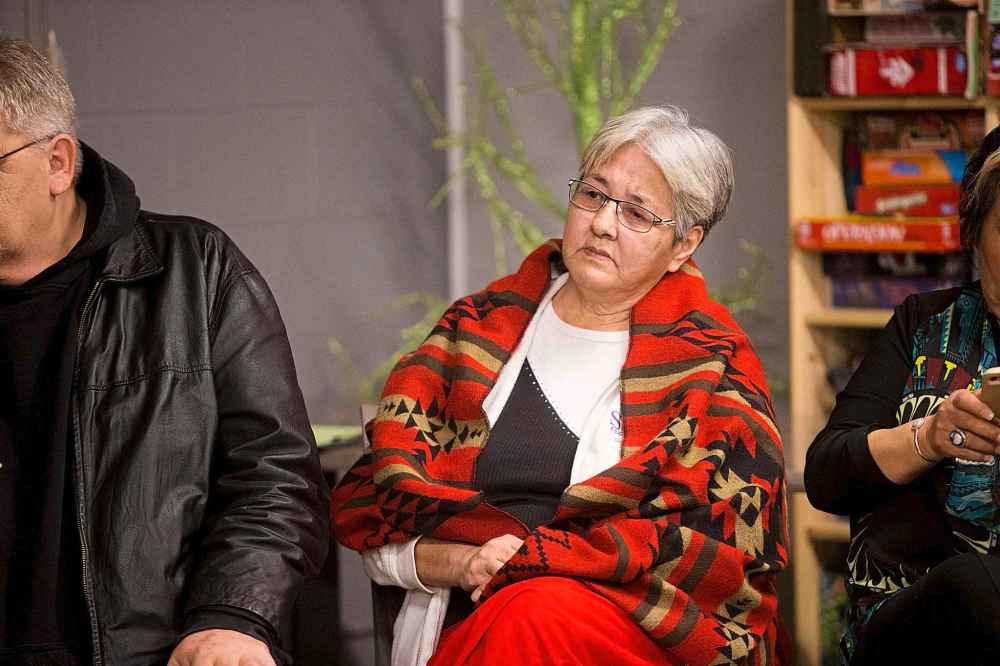‘A waste of time and money’
Grieving families doubt inquiry will protect Indigenous women and girls
Advertisement
Read this article for free:
or
Already have an account? Log in here »
To continue reading, please subscribe:
Monthly Digital Subscription
$0 for the first 4 weeks*
- Enjoy unlimited reading on winnipegfreepress.com
- Read the E-Edition, our digital replica newspaper
- Access News Break, our award-winning app
- Play interactive puzzles
*No charge for 4 weeks then price increases to the regular rate of $19.00 plus GST every four weeks. Offer available to new and qualified returning subscribers only. Cancel any time.
Monthly Digital Subscription
$4.75/week*
- Enjoy unlimited reading on winnipegfreepress.com
- Read the E-Edition, our digital replica newspaper
- Access News Break, our award-winning app
- Play interactive puzzles
*Billed as $19 plus GST every four weeks. Cancel any time.
To continue reading, please subscribe:
Add Free Press access to your Brandon Sun subscription for only an additional
$1 for the first 4 weeks*
*Your next subscription payment will increase by $1.00 and you will be charged $16.99 plus GST for four weeks. After four weeks, your payment will increase to $23.99 plus GST every four weeks.
Read unlimited articles for free today:
or
Already have an account? Log in here »
Hey there, time traveller!
This article was published 01/06/2019 (2389 days ago), so information in it may no longer be current.
OTTAWA — Days before a troubled national inquiry is set to release its final report, grieving Manitoba families who took part in its hearing process have little hope it will spark change.
“It was a waste of time and money,” said Thelma Favel, caregiver of her grand-niece, Tina Fontaine.
Favel has been disheartened by the work of the National Inquiry into Missing and Murdered Indigenous Women and Girls.

“They’re not going to prevent another death,” she said.
On Monday, commissioners are set to release their report near Ottawa, ending a process marred by bureaucratic ineptitude, numerous resignations and claims of inadequate focus on Manitoba.
The process culminated in an apparent leak of the report Friday.
Favel will fly to Ottawa for Monday’s ceremony, but was disappointed in the report, even before seeing it.
She said the inquiry’s $92-million budget could have better gone to 24-7 services for vulnerable Indigenous youth.
It’s still painful for Favel to hear the name of her grand-niece, almost five years after the discovery of 15-year-old Tina’s body in the Red River shocked Canada and sparked a countrywide outcry.
“I had to lose Tina for people to realize that there is a problem,” she said. “There’s still a lot of things happening out there.”
The inquiry began in September 2016 with a two-year mandate the Liberals prolonged by six months, over the commissioners’ calls to double its timeline.
Hilda Anderson-Pyrz, the inquiry liaison for Manitoba Keewatinowi Okimakanak, lost her sister Dawn in 2011. She feels police didn’t adequately probe her disappearance.
Anderson-Pyrz hopes the report touches on child welfare, criminal justice, poverty, homelessness and how these social systems leave children falling through the gaps, especially due to short-term funding allocations.
Her job of providing culturally appropriate support for families navigating the justice system is only funded until March 2020. She worries about what happens when the issue slips off the public radar.
“Where do these families go when we’re no longer there? I’ve been thinking about that a lot.”
Sheila North, a former MKO grand chief, said she hopes Monday’s report will focus society on solutions such as reforming child welfare and rectifying poverty, instead of gawking at horror stories in the media.
“We’re not talking about what needs to change,” she said. “I don’t have a lot of faith.
“Those issues have to be taken care of as a society, and I don’t see that happening.”
Indigenous leaders have blamed the inquiry for not adequately focusing on Manitoba, despite numerous advocates calling the province ground zero for MMIWG.
In July 2017, Marilyn Poitras resigned, leaving the inquiry with no commissioners representing either the Métis people or the Prairies.
In testimony, the commissioners have blamed red tape and privacy laws for hampering their work.
On Friday, the CBC reported it had obtained the final document, which has more than 1,200 pages and makes more than 230 recommendations. According to media reports, the slayings and disappearances of Indigenous women are referred to as “Canadian genocide.”
The network said the report will call on the justice system to review a practice meant to divert Indigenous offenders from long jail terms, but which often has the opposite effect in Manitoba.
Since 1999, courts have been told to consider so-called Gladue factors, such as intergenerational trauma, and use them to consider community-led rehabilitation.
But in Manitoba, probation officers often write both an offender’s Gladue report and reoffending-risk report, meaning the same factors intended to provide more lenient sentences are instead used to prescribe higher-security jail terms.
Whatever the report brings, Anderson-Pyrz wants it to include an oversight mechanism, to ensure the recommendations are monitored for progress instead of gathering dust.
The 2015 Truth and Reconciliation Commission of Canada lacked such a mechanism, and the Liberals promised this spring to start one in 2020, after urging by the former TRC chairman, Sen. Murray Sinclair.
Independent MP Jane Philpott, who served as Indigenous services minister, said the Liberals have tried to rectify the root causes identified in the inquiry’s interim report, but “a tremendous amount more work” is probably needed.
“I think people may be surprised by the breadth of how much work has to take place, in order to prevent the ongoing tragedies,” Philpott told the Free Press.
dylan.robertson@freepress.mb.ca
History
Updated on Saturday, June 1, 2019 11:22 AM CDT: Adds photo



